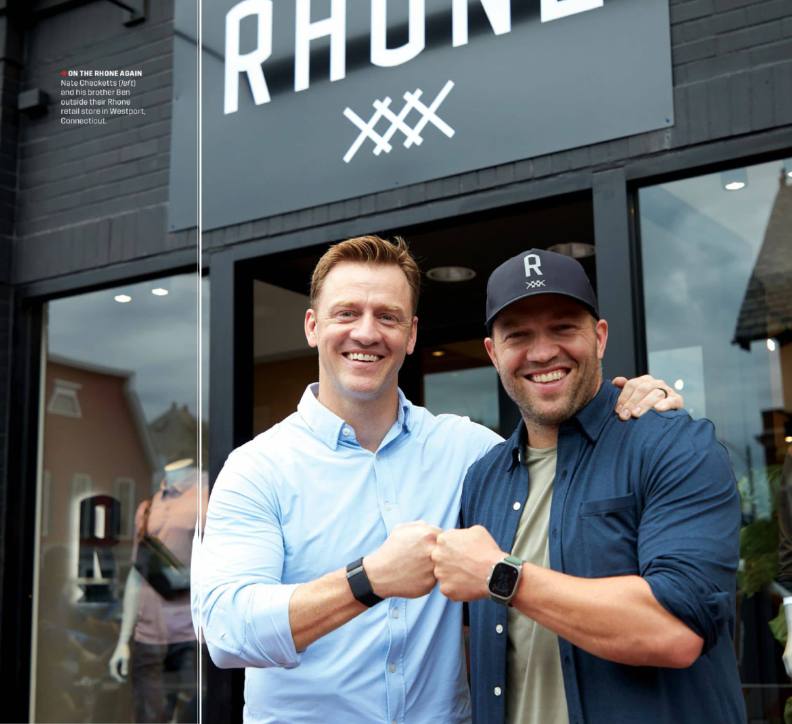
Nate Checketts had just closed the biggest deal of his career, bringing a major private equity investor into his apparel brand Rhone. He was feeling pretty good.
Then he spoke with a friend who'd closed a similar deal.
"Yeah," said the friend, "I've got two years, and if I don't do my job, they'll replace me." Oh, wow, Nate thought to himself. What did I just do? Investments can be game-changing for companies, of course. They provide the capital to take risks, innovate, boost marketing, and more. But when a founder raises money, the goals of their company change: They must now build toward a big exit, so their investors get a return on their investment.
What if a founder has other priorities, other hopes? Could they ever regain control? Eventually, those questions began to weigh on Nate (Rhone's CEO), as well as his brother and cofounder, Ben Checketts (Rhone's creative director). What if we want to be different? the brothers wondered. Could they ever grow on their timeline, thinking more about long-term (and maybe even lifetime) investments?
To do that, the Checketts brothers came to realize, they'd need to buy out their private equity partner. But who even does that? And how?
In July 2022, nearly five years after taking the private equity money, they figured it out. News quickly spread among startup founders, and many started calling the Checketts brothers to ask how they did it. These founders had been asking themselves similar questions, wondering how to rewrite the playbook on growth and funding. Maybe there was a different way to grow a business-one where fundraising doesn't lead to soon losing control?
"In theory, nothing changed for us," says Nate, who is now talking about the deal publicly for the first time. "But really, it's the mindset: Everything has changed."
This story is from the {{IssueName}} edition of {{MagazineName}}.
Start your 7-day Magzter GOLD free trial to access thousands of curated premium stories, and 9,000+ magazines and newspapers.
Already a subscriber ? Sign In
This story is from the {{IssueName}} edition of {{MagazineName}}.
Start your 7-day Magzter GOLD free trial to access thousands of curated premium stories, and 9,000+ magazines and newspapers.
Already a subscriber? Sign In

Chords of Success
For Saahil Goel, the deep-rooted passion for playing the guitar dates back to his high school days. Influenced by legends like Pink Floyd, Led Zeppelin, and the Pakistani band Strings, his musical journey mirrors his leadership style-balancing focus, discipline, and a collaborative spirit. Goel feels that playing guitar has enhanced his ability to balance focus and teamwork as a founder of an eCommerce shipping start-up.

IS YOUR RENT TOO DAMN HIGH?
Many small business owners struggle with their rents. Here's what to do.

HOW TO BOUNCE BACK FROM A BAD REVIEW
A one-star review can hurt your ego - and your business. But it's possible to prevent (and remedy!) this scary scenario.

HOW TO HIRE FOR THE FUTURE
Small businesses are struggling to find quality labor. So flip the conversation: Show workers how your business will set them up for opportunity.

You Can Hire Like Netflix
The streaming platform built an incredible team with a strategy called “talent density.” But you don’t need to be a tech giant to do it.

Speedy Growth Killed My Startup
We seemed to be rocking it - lots of press, major partnerships. Then we learned the harsh consequences of overlooking our customers.

Three Pivots to $100 Million
How do you find a working business model? Do it like Rowan-a brand that reinvented itself many times before finally piercing the ear-piercing market.

What Goals Actually Matter?
Some benchmarks are more important than others so what should you really care about? We asked six founders for their hardest-won lessons.

'Only the Strongest Are Going to Survive'
Brian Lee cofounded companies like LegalZoom and ShoeDazzle-and he believes a lot of conventional business wisdom is backward. Sure, it's harder to raise capital. But it's actually cheaper than ever to start a company.

HOW TRUST SAVED KFC
The former CEO of Yum! Brands explains how he turned around a struggling KFC-and the important lesson it offers for anyone in franchising.